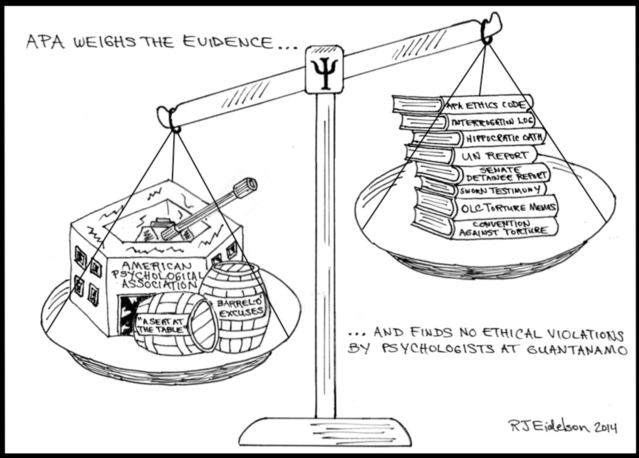Ethics and Morality
Facing History: My Reply to APA CEO Arthur Evans
Turning the page doesn't mean denying the past.
Posted October 25, 2017

In a recent Washington Post commentary, I made four points. First, psychologists played essential roles in the government-authorized torture and abuse of “war on terror” detainees. Second, the American Psychological Association (APA) facilitated this involvement by secretly accommodating CIA and Defense Department interests, by contesting evidence of wrongdoing with deceptive public statements, and by repeatedly rebuffing calls for stronger anti-torture action. Third, to its credit APA has subsequently pursued difficult and meaningful reforms aimed at resetting its moral compass. And fourth, especially in this fraught political climate, the profession and APA must now vigilantly fend off efforts by self-interested parties committed to turning back the clock on this hard-won progress.
Given this combination of disturbing history and encouraging developments, I was disheartened to read a follow-up letter in the Washington Post from APA’s new CEO Arthur Evans Jr., responding to my essay. While commending the valuable work of psychologists in many spheres (I certainly agree), Evans held APA blameless, portraying the profession’s dark-side participation as solely that of “two rogue psychologists”—CIA contractors James Mitchell and Bruce Jessen. This narrative is profoundly and transparently false. The dreadful engagement of psychology and psychologists went much further, as revealed in numerous government and non-governmental reports, witness depositions, declassified memos, and other materials—including a comprehensive independent review that documented APA’s own institutional machinations.
Indeed, this week there’s a fresh entry to these cautionary annals: the new book Unjustifiable Means: The Inside Story of How the CIA, Pentagon, and US Government Conspired to Torture by Mark Fallon, a former Naval Criminal Investigative Service special agent and counterintelligence officer. Fallon provides an insider’s account of detainee mistreatment at Guantanamo Bay. The culprits he identifies include Morgan Banks and Larry James, two military psychologists who were directly involved in helping APA leaders craft and defend flawed, overly-permissive ethics policies. Fallon reports that Banks arranged training in “harsh and illegal intel exploitation techniques;” trained Guantanamo personnel in “breaking down detainees;” and provided “medical cover” for the harsh interrogations there. He writes that James “viewed Gitmo as a career opportunity to psychologically exploit detained prisoners” and was "personally involved" in the spread of torture at Guantanamo.
I hope that Mr. Evans, upon further reflection, chooses to correct the record. For those of us who struggled for years to expose psychologists’ complicity and counter APA’s denials, his letter recalls an earlier era when self-righteous claims of innocence were a standard part of APA’s manipulative and disingenuous public relations campaign. The profession, APA, and the country can’t afford a return to those days. Only a clear-eyed view of past transgressions can light the way for a vigorous and unflinching defense of psychology’s do-no-harm principles.


